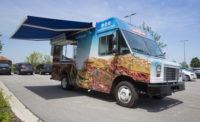No Truck Travels Empty

Refrigerated & Frozen Foods talks with Jeff Blouch, distribution manager for ASK Foods, Inc. Find out how his team turns over every rock to continue rolling out fresh product just-in-time.
Refrigerated & Frozen Foods: Summarize ASK Foods’ approach to supply chain and logistics?
Jeff Blouch: There are two basic tenets to our supply chain approach. The first is that inbound and outbound traffic must support our made-to-order/short-order cycle environment. The second is never travel empty. It sounds simplistic but is not always the case in a fast-pace real world environment. The spark that makes it all happen is relationships.
On inbound, we schedule pickups of ingredients and packaging on return trips. Highly perishable items such as produce require a partner with the same vision you have for your customers. This enables us to place an order as late as noon and still take receipt early the next morning. On high-volume items, we negotiate consignment arrangements with vendors at nearby cold storage facilities to enable quick deliveries. With small quantities, sometimes the best value may be in your own backyard. An agreement with foodservice warehouses who are also your customers may be the most economical. Seasonal offerings and popular trends require phasing in and out of products. If you haven’t established realistic minimums, you could be swimming in slow moving—or worse yet—dead inventory.
Outbound can be especially challenging. At a recent local food conference when a transportation speaker was asked how to get 2-6 pallets of perishables next day into New England, the response was, “good luck with that!” Despite the pessimism, there are innovative solutions out there. For example, we have formed our own network of like-minded vendors. Vendors with similar geographic distribution needs can be helpful. Additional good resources can be found through dialogue with your customer’s distribution team and even the truck drivers from your own company. Create customer and supplier partnerships to handle those difficult trucking lanes. You would be amazed at all the empty pallet spaces available on trucks. There is a goldmine awaiting the logistics professional who can develop an extensive database to support a rapid response perishable network for the East coast.
R&FF: How is ASK Foods’ retail supply chain function organized vs. how the foodservice supply chain function is organized?
Blouch: The retail vs. foodservice supply chain has become blurred, as foodservice is now an integral part of the retailers’ prepared food offerings. True to our customization philosophy, retail channels are handled in a number of ways. ASK works through customers’ and third-party logistics’ warehouses, taking advantage of their backhaul schedule. We utilize compartmentalized multi-unit trailers where fresh and frozen can be shipped together. High density picking has been installed for those customers who request the value-added service that orders be organized at the retail unit level. Where short-order cycles and narrow delivery windows occur, we fill the gap with our own ASK fleet.
The real key in all cases is speed through the chain and proper handling. In order to support our mission of [producing] fresh, great-tasting food with no preservatives, velocity through the cold chain is critical.
On the conventional foodservice side, we achieve a high service level by forecasting inventories that permit a 12-hour turnaround. Nearly all of our foodservice warehouses coordinate a backhaul with their fleet in the area. This approach is especially effective during the peak demands of holiday orders.
R&FF: What are some key warehousing/transportation initiatives that took place over the past year? Any initiatives in place for 2013?
Blouch: In 2012, we continued to reduce and supplement our leased fleet through an extensive utilization of backhauls. This supports our goal that no truck should travel empty, whether it’s ours or a third-party freight carrier, thus helping to contribute to a greener environment. On the warehousing side, we continued to improve our lot control and inventory management through the expansion and implementation of a new scan gun and bar coding system. Now, 100% of our inventory is controlled in this manner, better positioning us for the ever-changing SQF and food regulatory requirements.
As far as 2013, we will continue to focus on logistics, seeking more efficient ways to ship to our customers and receive product from our vendors. As we continue to grow, we remain open to expanding our on- site warehouse space where appropriate for accommodating our increased inventory needs.
R&FF: What were some challenges faced over the last year?
Blouch: Our strong sales growth over the past several years has begun to put pressure on our internal storage space. We are fortunate that we have built strong partnerships with our local cold storage suppliers in order to supplement these needs. As we plan further expansions to our plants, we will need to balance our use of in-house and third-party storage space. Additionally, the rise in fuel prices over the past year has been challenging and heightened the need for freight consolidation to minimize the financial impact to ASK, our customers and our suppliers.
R&FF: ASK Foods is receiving Refrigerated & Frozen Foods’ 2013 Refrigerated Foods Processor of the Year award. How does this culminate with what ASK Foods is trying to achieve from a supply chain/logistics standpoint?
Blouch: We are extremely proud to receive this award. Whether it is marketing, order processing, purchasing, planning/production, quality assurance, sanitation, warehousing or distribution, this award validates the infrastructure required and the team effort needed to support our company’s mission to provide superior quality prepared foods quickly to the marketplace.
R&FF: If you had to advise someone in the industry about supply chain and logistics with regard to refrigerated and frozen foods, what would you tell them?
Blouch: Whether refrigerated or frozen food, turn over every rock to minimize your inventory and create cash flow. Although interest rates are at ridiculously low levels, they could change in a heartbeat. Our product line demands a high degree of flexible manufacturing and getting product in front of the end user within a day or two. This is our business model. Long-term storage of product does not fit into that model. Even large food manufacturers with dedicated lines are recognizing the need to change their production planning horizon and compress the production schedule. The goal is the same—to meet the needs of consumption rather than the false comfort and overrated economies of elevated inventory levels.
MEET JEFF BLOUCH
Jeff Blouch has been the distribution manager for ASK Foods, Inc. for the past seven years. He is responsible for inbound and outbound freight, and maintains 22 years of experience in the industry.
Looking for a reprint of this article?
From high-res PDFs to custom plaques, order your copy today!








